
Sign Up
Want to receive a newsletter to learn more about KuneKune pigs and other educational information? Sign up to have them delivered right to your inbox.
We look forwarded to sending you some great info.
Can Pig Eat - All Your Qs Answered
We frequently hear can pigs eat corn? Can pigs eat potatoes? Can pigs eat...the list goes on and on. Therefore, we have compiled an extensive list of answers to these commonly asked questions so that every pig owner can easily have this information at the tip of their fingers.
In the wild, they would consume anything from fruits and vegetables to small insects. However, when it comes to domesticated pigs, their diet is usually regulated by their caretakers to ensure they receive proper nutrition. Pigs have long been associated with their voracious appetites and are known for their diverse diet, and their omnivorous nature allows them to consume a wide range of food items. Omnivorous means that one can consume plant-based and animal-based food sources. They have a diverse diet and can consume a wide range of fruits, vegetables, grains, and even meat. However, can pigs eat...
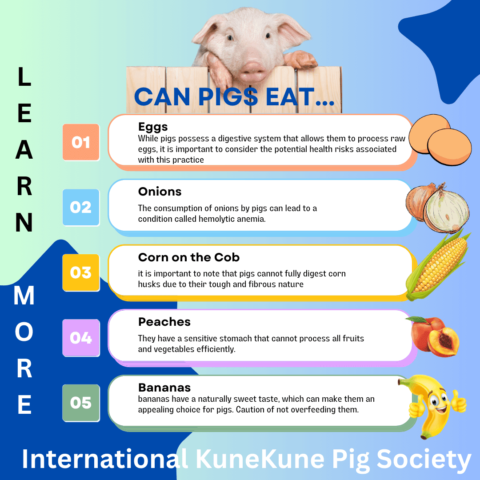
Click on the tab to be directed to that part of the article.
Don't forget to check out KuneKune Pig Feeding 101: Everything You Need to Know
Can Pigs Eat Eggs?

When it comes to raw eggs, some uncertainties arise regarding the safety and nutritional aspects. Let's explore whether pigs can eat raw eggs, taking into consideration their digestive system, potential health risks, and nutritional benefits.
Digestive System of Pigs
Pigs possess a fairly robust digestive system that enables them to handle a variety of food sources. Their stomachs have a lower pH, facilitating the digestion of proteins, including those found in raw eggs. Additionally, pigs have a strong immune system that helps combat pathogens present in raw foods. These natural attributes imply that pigs may be capable of consuming raw eggs without complications.
Health Risks
While pigs possess a digestive system that allows them to process raw eggs, it is important to consider the potential health risks associated with this practice. Raw eggs can contain numerous pathogens such as Salmonella and E. coli, which can cause severe illnesses in both animals and humans. Consuming raw eggs risks contamination, which may lead to gastrointestinal issues, bacterial infections, or even more significant health complications. Therefore, allowing pigs to consume raw eggs should be approached with caution.
Nutritional Benefits
When cooked, eggs are considered a highly nutritious food source for both humans and animals due to their high protein content, essential amino acids, vitamins, and minerals. However, the cooking process alters the protein structure, reducing its availability for digestion. Raw eggs, on the other hand, provide the most bioavailable form of proteins, nutrients, and healthy fats. As pigs require a protein-rich diet to support their growth and muscle development, raw eggs could potentially offer substantial nutritional benefits if consumed safely.
Safe Consumption of Raw Eggs by Pigs
To minimize the risks associated with consuming raw eggs, certain precautions should be taken. Eggs should be sourced from reliable and trusted sources, ensuring they are clean and fresh. It is recommended to wash the eggs and inspect for any cracks or damage that may increase the likelihood of bacterial contamination. Feeding pigs raw eggs immediately after separating them from the shells and avoiding any prolonged exposure to air can also help reduce the risk of contamination.
Conclusion
While pigs have a digestive system well-suited for processing raw eggs, it is crucial to consider the potential health risks involved. The risk of pathogen contamination in raw eggs can lead to severe illnesses in both animals and humans. Thus, it is recommended to cook eggs before consumption to eliminate any potential pathogens. Nonetheless, if appropriate precautions are taken, such as sourcing fresh eggs from reliable sources, the nutritional benefits of raw eggs for pigs can be safely realized. The decision to include raw eggs in a pig's diet should be based on a thorough consideration of the potential health risks and nutritional benefits.
Can Pigs Eat Eggshells?
This is a common question among pig owners and farmers alike. While it may seem like a simple query, the answer is not as straightforward as one might think. In this article, we will explore the nutritional benefits and potential risks of feeding eggshells to pigs and discuss the most appropriate course of action.
Eggshells are primarily composed of calcium carbonate, which is a vital nutrient for pigs. Calcium is necessary for bone development, muscle contraction, and blood clotting. It is especially crucial for lactating sows, as they need extra calcium to produce milk for their piglets. Thus, incorporating calcium-rich supplements in a pig's diet can be beneficial.
Bacteria and Pathogens
However, before deciding to feed eggshells to pigs, it is important to consider a few factors. Primarily, the eggshells must be thoroughly cleaned to avoid any potential contamination. Pigs are known to scavenge for food, and consuming uncleaned eggshells might introduce harmful bacteria or pathogens into their system. Therefore, it is essential to wash the eggshells thoroughly and ensure that they are free from any organic matter before feeding them to pigs.
Calcium
Additionally, eggshells should not constitute the primary source of calcium in a pig's diet. While they can be a useful supplement, pigs still require a balanced and complete diet that meets their nutritional needs. A diet based solely on eggshells may lack essential nutrients such as protein, carbohydrates, vitamins, and other minerals. Therefore, it is crucial to consult with a veterinarian or a nutritionist to develop an appropriate feeding plan for pigs.
Furthermore, it is important to be mindful of the quantity of eggshells given to pigs. Excessive calcium intake can lead to an imbalance in the pig's diet, causing potential health problems such as urinary stones or kidney issues. Moderation is key, ensuring that the pig receives an appropriate amount of calcium without overloading its system.
While eggshells can be a beneficial supplement for pigs, their consumption should be approached with caution. Ensure that the eggshells are cleaned properly, do not rely on eggshells as the main source of calcium in a pig's diet, and avoid overfeeding them. Monitoring the pig's overall health and consulting with professionals when making dietary changes is crucial.
Summary
Pigs can eat eggshells, but caution and moderation should be exercised. The calcium-rich nutrients can be beneficial for their health, particularly in lactating sows or during periods of bone development. However, it is important to consider cleanliness, avoid sole reliance on eggshells for essential nutrients, and prevent overconsumption. By following these guidelines and seeking professional advice, pig owners can effectively utilize eggshells as a supplement in a pig's diet.
Can Pigs Eat Horse Feed?
The question of whether pigs can eat horse feed is an interesting one, as it raises concerns about the dietary needs and compatibility of different animals. However, when it comes to horse feed, there are several factors to consider before determining if it is suitable and beneficial for their diet.
To start with, it is important to understand the nutritional requirements of pigs. Pigs are monogastric animals, meaning they have a single-chambered stomach. Unlike ruminants such as cows, which have a multi-chambered stomach capable of fermenting fibrous materials, pigs have a simpler digestive system.
Horse feed is designed to meet the needs of horses and their feed requirements. It typically consists of a mixture of grains, forage, vitamins, and minerals. Horse feed is designed to provide horses with the necessary energy, protein, and nutrients required to support their muscle development, metabolism, and overall health.
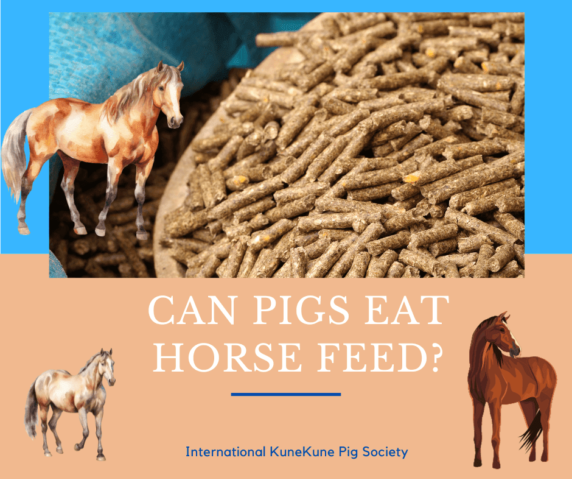
Nutritional & Health Factors
While pigs can consume horse feed, it may not necessarily provide them with all the essential nutrients they need for optimum health. Pig feeds are specially formulated to meet the unique dietary requirements of pigs. These feeds are typically high in protein and contain specific vitamins and minerals that are essential for pig growth and development.
Furthermore, the composition of horse feed may not be ideal for pigs. Horse feed often contains ingredients such as molasses, which can be high in sugar content. Pigs have a fast metabolism and are sensitive to elevated levels of carbohydrates, leading to potential weight gain and health issues such as obesity or metabolic disorders. Therefore, if pigs are fed an excessive amount of horse feed, it could result in imbalanced nutrition.
Size and Texture
Another factor to consider is the size and texture of the horse feed. Pigs are known for their voracious appetite, and they tend to eat quickly. If the horse feed is in the form of pellets or grains, it may lead to choking or obstructing the pig's digestive tract. This risk can be minimized by ensuring the horse feed is ground or mixed with other ingredients to make it more suitable for pig consumption.
Summary
In conclusion, while pigs can eat horse feed, it is crucial to consider their nutritional needs and overall health. Pigs have specialized dietary requirements that differ from horses, and solely relying on horse feed for their nutrition may pose risks. Therefore, it is advisable to provide pigs with a proper diet formulated specifically for their needs, ensuring their overall well-being and growth.
Can Pigs Eat Onions?
When it comes to the specific question of whether pigs can eat onions, the answer is a bit more complicated. Onions, garlic, leeks, and chives are grouped together and often are called allium vegetables. Allium vegetables contain compounds called thiosulfates, which give them their pungent smell and taste. These compounds are responsible for the potential toxicity of onions to various animals, including pigs.
Health Concerns
The consumption of onions by pigs can lead to a condition called hemolytic anemia. This condition involves the destruction of red blood cells, leading to weakness, pale skin, and potential organ damage. The toxic components of onions, such as N-propyl disulfide and thiosulfates, can cause oxidative damage to red blood cells and disrupt their normal functioning. Therefore, it is recommended to avoid feeding onions to pigs, especially in enormous quantities.
However, it is important to note that pigs have a strong digestion system compared to some other animals. This means that they may be able to tolerate insignificant amounts of onions without experiencing any significant health issues. Additionally, different pig breeds may have various levels of sensitivity to onions.
While some farmers may choose to avoid feeding onions to their pigs altogether, others may allow limited consumption, taking into consideration the potential risks and benefits. Onions can be used as flavor enhancers in pig feed to make it more appealing to the animals. However, it is crucial to control the amount of onion used and to monitor the pigs' health and well-being closely.
Furthermore, the way onions are prepared can also affect their toxicity. Onions that are cooked or processed in some way, such as boiled or fried, tend to have lower levels of thiosulfates. This is because heat breaks down the toxic compounds, reducing their potential harm. Therefore, if onions are fed to pigs, it is advisable to cook or process them before offering them as part of the animals' diet.
Summary
In conclusion, while pigs are omnivorous animals with a diverse diet, the consumption of onions can be potentially harmful to them. Onions contain compounds that can lead to hemolytic anemia in pigs. It is recommended to avoid feeding onions to pigs, especially in enormous quantities. However, insignificant amounts of cooked or processed onions may be tolerated by some pigs, although careful monitoring of their health is essential. Farmers should prioritize the well-being and health of their pigs and make informed decisions regarding their diet.
Can Pigs Eat Corn on the Cob?

This is most definitely a question asked frequently. So, we will explore the dietary needs of pigs, their ability to digest corn, and the potential benefits and risks associated with feeding them corn on the cob. Corn, being a staple ingredient in animal feeds, is widely fed to pigs in various forms. However, the specific question about pigs eating corn on the cob arises due to differences in how they eat and digest.
Digestion
Firstly, it is important to note that pigs cannot fully digest corn husks due to their tough and fibrous nature. While the cob itself is soft and can be consumed, the husks can cause digestive issues and may even lead to intestinal blockages. Therefore, before offering corn on the cob to pigs, the husks should be removed to prevent any potential harm.
Corn kernels, on the other hand, can be a valuable source of carbohydrates for pigs. Corn is high in energy content and contains essential nutrients such as protein, vitamins, and minerals, making it a suitable addition to their diet. However, it is always advisable to mill or grind the corn kernels into a more digestible form before feeding them to pigs. This ensures better digestibility and nutrient absorption, promoting optimal health and growth.
Important Considerations
Feeding pigs corn on the cob in its raw, unprocessed form may present certain risks. The tough nature of the cob can pose a choking hazard, and the pigs may struggle to break it down effectively. There is also a possibility of dental issues, as the corn kernels can get lodged or cause damage to their teeth. Thus, it is crucial to make sure the pigs can consume corn kernels without any cob fragments. Additionally, moderate consumption should be maintained to ensure a balanced diet.
Summary
In conclusion, can pigs eat corn on the cob? While pigs cannot digest the husks and consuming corn on the cob in its raw form poses certain risks, they can benefit from the nutritional value of corn kernels. It is vital to remove husks and grind the kernels before offering them to pigs to ensure better digestion and prevent potential harm. Responsible feeding practices and considerations for the pigs' well-being should guide the decision-making process for incorporating corn into their diet.
Can Pigs Eat Corn Husk?
Before delving into the specifics, it is important to note that a pig's diet should be based on a balanced and nutritious intake that provides them with the necessary vitamins, minerals, and energy. Corn husks are often discarded by humans after the corn kernels have been removed. They are fibrous and do not possess much nutritional value on their own.
One aspect to consider when discussing whether pigs can eat corn husks is the pig's ability to digest cellulose. Cellulose is the main component of plant cell
walls and is found in excessive amounts within corn husks. Pigs have a remarkable ability to digest cellulose compared to other animals due to the structure
of their digestive system. They have a specialized stomach compartment called the "cecum" that contains symbiotic bacteria responsible for breaking down cellulose. As a result, pigs can potentially digest corn husks and extract some nutrients from them.
Digestion
However, despite their ability to digest cellulose, corn husks should not be a primary or significant part of a pig's diet. While pigs can consume lesser amounts of corn husks without immediate harm, these husks are low in energy and essential nutrients. Pigs require a balanced diet that contains proteins, fats, carbohydrates, and other essential vitamins and minerals. A diet solely based on corn husks would lack these crucial nutrients, leading to nutritional deficiencies and poor pig health.
Risk
Furthermore, there are risks associated with pigs consuming corn husks. The fibrous nature of corn husks can lead to digestive issues, such as intestinal blockages or impactions. These issues can be severe and even fatal for pigs if not promptly addressed. Additionally, if the corn husks have been treated with pesticides or herbicides, consuming them can expose pigs to harmful chemicals, leading to health problems.
Summary
In summary, while pigs are capable of digesting cellulose and extracting some nutrients from corn husks, these fibrous plant materials should not make up a sizable portion of their diet. Corn husks lack essential nutrients and energy, and a diet centered around them could result in nutritional deficiencies and poor pig health. Additionally, the risks associated with digestive issues and exposure to potentially harmful chemicals make it advisable to limit pigs' consumption of corn husks. It is crucial to provide pigs with a balanced diet that focuses on appropriate grains, fruits, vegetables, and protein sources to ensure their well-being and optimal health.
Can Pigs Eat Peaches?
This question has been a topic of debate among many people. While some argue that pigs can consume peaches without any adverse effects, others believe that it is not suitable for them. To conclude, it is crucial to examine the nutritional needs of pigs, their digestive abilities, and the potential risks associated with feeding them peaches.
Nutrition
Peaches, being some fruit, contain several essential nutrients that can be beneficial for a pig's diet. They are a useful source of vitamin C, and dietary fiber, and contain other minerals like potassium and antioxidants. These elements are vital for a pig's growth, immune system, and overall well-being.
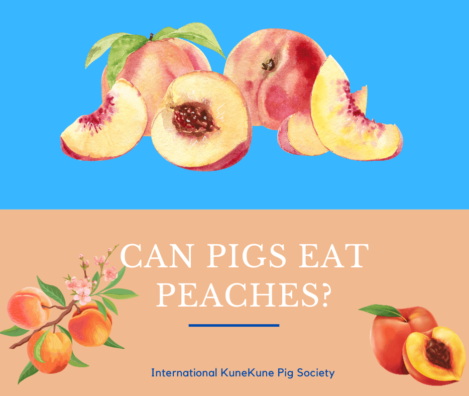
Digestion
On the other hand, the digestive system of a pig must also be taken into consideration. Unlike humans, pigs have a simple digestive tract, which makes them more prone to certain health issues. They have a sensitive stomach that cannot process all fruits and vegetables efficiently. Some fruits, like grapes or raisins, can cause kidney damage in pigs, so it is important to always be cautious when introducing new foods into a pig's diet.
Risk
Another potential risk associated with pigs consuming peaches is the presence of cyanide compounds in the seeds and the pits. These compounds can be harmful to animals, including pigs if consumed in enormous quantities. However, it is important to note that the flesh of the peach does not contain significant levels of these compounds. Therefore, if the peaches are properly prepared by removing the seeds and pits, the risk of cyanide poisoning is minimized.
Summary
In conclusion, while peaches can be a nutritious addition to a pig's diet, caution must be exercised. Pigs can eat peaches if they are properly prepared, removing the seeds and pits to minimize the risk of cyanide poisoning. However, pig owners should always consult with professionals to ensure the safety and suitability of any new food introduced to their pigs.
Can pigs eat Green Beans?
This is a question that has been asked by many individuals who are either considering or are already raising pigs. The short answer to this inquiry is yes, pigs can indeed eat green beans. However, there are a few considerations that need to be considered before introducing green beans into a pig's diet.
Nutritional Value
Green beans are a nutritious vegetable that is packed with vitamins, minerals, and fiber. They provide an excellent source of vitamins A, C, and K, as well as folate and potassium. They also contain antioxidants, which play a crucial role in maintaining a pig's overall health. Moreover, green beans are low in calories, making them a healthy option to include in a pig's diet.
One of the main reasons why green beans are suitable for pigs is their high fiber content. Fiber is essential for promoting good digestion in pigs, as it helps regulate their bowel movements and prevent constipation. Additionally, green beans can serve as an alternative to other high-calorie foods in a pig's diet, making them an excellent choice for managing weight and preventing obesity in these animals.
Moderation is key
It is worth noting that while green beans are safe for pigs to consume, moderation is key. Green beans should be offered in appropriate portions as part of a well-balanced diet. Like any other food, overconsumption of green beans can cause digestive issues in pigs, including diarrhea. It is crucial to consult a veterinarian or animal nutritionist to determine the appropriate amount of green beans to feed your pig, based on its specific dietary needs and overall health.
Raw or Cooked
Another factor to consider is the preparation of green beans before offering them to pigs. While humans often cook green beans before consuming them, pigs can eat them raw. It is essential to thoroughly wash green beans to remove any chemicals or pesticides that may be present on the surface. Additionally, if the green beans have strings, it is advisable to remove them before feeding them to pigs, as these strings can cause choking hazards.
Summary
In conclusion, pigs can safely eat green beans as part of a balanced diet. Green beans provide pigs with vital nutrients, including vitamins, minerals, and fiber. They offer a healthy, low-calorie alternative to other foods and can contribute to maintaining a pig's overall health and weight. However, it is important to feed green beans in moderation and consult a professional to determine the appropriate amount for your pig. By following these guidelines, you can ensure that your pig enjoys the nutritional benefits of green beans without any adverse effects on its health.
Can Pigs Eat Bamboo?

Bamboo is often considered a type of grass that grows in various regions around the world. It is well-known for its versatility and countless uses in construction, furniture making, and even as a food source for humans as bamboo shoots. However, when it comes to pigs, the nutritional value of bamboo for them is a topic of interest.
Nutrition
Firstly, it is important to acknowledge that bamboo has a high fiber content which can be beneficial for digestion in animals. Pigs, being natural foragers, often consume several types of vegetation and grasses in their wild habitats, so it is plausible to assume that pigs can eat bamboo. There are pig farmers and breeders who include bamboo in the diets of their pigs as a source of roughage and fiber.
Digestion
However, there are some concerns related to the digestibility of bamboo for pigs. Bamboo has a high lignin content, which is a complex compound that is less digestible and can cause digestive issues for animals. The high lignin content may disrupt the normal digestive processes of pigs, leading to discomfort and potential health problems. Additionally, bamboo shoots, which are another part of the bamboo plant, contain cyanogenic glycosides that can be toxic if not properly processed before consumption.
Another aspect to consider is the age of bamboo. Young bamboo shoots have a more tender texture and may be easier for pigs to consume and digest. On the other hand, mature bamboo has harder fibers that are more difficult to break down and digest. Therefore, if pigs are to be fed with bamboo, it is essential to ensure that it is at an appropriate age and prepared properly.
Moreover, as with any food that is not part of a pig's regular diet, introducing bamboo should be done gradually and in moderation. Abrupt changes in a pig's diet can disrupt their gut flora and cause digestive disturbances. It is important to consult with a veterinarian or an experienced pig nutritionist before incorporating bamboo into a pig's diet.
Summary
In conclusion, while pigs are omnivorous animals that can consume a variety of plant-based foods, the topic of whether pigs can eat bamboo remains unclear. Bamboo can offer certain nutritional benefits due to its fiber content, but it also poses potential challenges due to its high lignin content and the presence of toxic compounds in shoots. Therefore, if one decides to feed pigs with bamboo, it should be done cautiously, taking into consideration the age of the bamboo, proper preparation methods, and guidance from professionals in pig nutrition.
Can Pigs Eat Bananas?
Do pigs like bananas?
This is an interesting question that may have different answers depending on the perspective. While it is true that pigs are omnivores and can consume several types of food, including bananas, whether or not they enjoy them is uncertain. KuneKune really seems to.
Some anecdotal evidence suggests that pigs do indeed like bananas. Pig owners and farmers have reported that their pigs show excitement and enthusiasm when offered bananas as a treat. Pigs are highly curious and intelligent animals, and the introduction of a new and tasty food source may often excite them.
Moreover, bananas have a naturally sweet taste, which can make them an appealing choice for pigs. Pigs possess taste receptors similar to humans, enabling them to detect various flavors. The sweetness of bananas, combined with their soft texture, may attract pigs, and contribute to their enjoyment.
Health Considerations
On the other hand, it is essential to consider the potential health implications of feeding pigs bananas excessively. While bananas can provide some nutritional benefits, such as potassium and vitamin C, they are also relatively high in sugar. Overconsumption of sugary fruits can lead to weight gain and other health issues for pigs, just as it can for humans.
Additionally, the natural diet of pigs consists of a diverse range of foods, including grass, roots, and insects. It is crucial to prioritize a balanced and varied diet for them, rather than relying solely on bananas. Pigs need access to a mixture of foods to ensure they receive all the necessary nutrients to thrive.
Summary
In conclusion, while pigs may enjoy bananas, it is crucial to approach their dietary needs responsibly. While offering bananas as an occasional treat can add variety to their diet, it is essential to ensure a balanced intake of other food sources. Pigs, like any other living being, have their individual preferences, and while some may enjoy bananas, others may have different tastes. It is important to consider the health implications and nutritional balance for these intelligent creatures.
Can Pigs Eat Potatoes?
Potatoes are a starchy staple food consumed by humans worldwide. They are rich in carbohydrates, dietary fiber, vitamins, and minerals, making them a valuable source of nutrition for people. However, when it comes to feeding potatoes to pigs, there are certain considerations to be taken into account.
Firstly, it is essential to note that pigs can indeed eat potatoes. Potatoes are commonly included in pig diets, especially in commercial pig farming settings. Pigs have a high tolerance for starch, and potatoes provide a significant energy boost due to their carbohydrate content. Moreover, potatoes are relatively inexpensive and widely available, making them a cost-effective dietary component for swine.
Apart from being a valuable source of energy, potatoes also offer several essential vitamins and minerals that contribute to a pig's overall health. Potatoes contain potassium, vitamin C, and vitamin B6, among other micronutrients, which are vital for muscle and nerve function, immune system support, and general growth and development.

Nevertheless, it is important to consider the potential risks associated with feeding potatoes to pigs. While potatoes are generally safe for pigs, there are a few precautions to be taken. Pigs should not be fed green or sprouted potatoes as they contain solanine, a toxic substance that can be harmful to both humans and animals. Ingestion of solanine can lead to gastrointestinal disturbances such as vomiting, diarrhea, and even nervous system disorders. Therefore, it is crucial to ensure that only ripe, fresh, and non-toxic potatoes are fed to pigs.
Additionally, potatoes should not constitute the sole source of nutrition for pigs, as their diet should be diverse and well-balanced. Pigs require a balanced intake of protein, fats, carbohydrates, vitamins, and minerals to support their growth, reproduction, and overall well-being. While potatoes offer carbohydrates and some essential nutrients, they do not provide all the necessary elements for a pig's optimal development. Therefore, a complete diet that combines various food sources should be formulated to meet the nutritional requirements of pigs.
Summary
To conclude, pigs are capable of consuming potatoes and can benefit from their nutritional value. Potatoes supply energy, vitamins, and minerals, making them a suitable component of a pig's diet. However, precautions should be taken to avoid feeding green or sprouted potatoes as they contain toxic substances. Moreover, it is important to maintain a balanced diet for pigs, incorporating other food sources to provide a wide range of nutrients necessary for their growth and well-being. By considering these factors, pigs can safely enjoy the occasional treat of potatoes while benefiting from their nutritional merits.
Can pigs eat Okra?
Okra, scientifically known as Abelmoschus esculentus, is a popular vegetable that is widely consumed in various parts of the world. Its unique texture and flavor make it a versatile ingredient in many cuisines, especially in Southern cooking.
Nutrition
While okra contains some of these essential nutrients, it may not be sufficient to meet all of a pig’s nutritional requirements. Okra is known for being low in calories and high in dietary fiber, antioxidants, and vitamins such as vitamin C, vitamin K, and vitamin A. These characteristics might make one assume that it is a suitable food option for pigs as well. However, pigs’ diets are usually based on grains, vegetables, and animal protein sources to provide them with the necessary energy and nutrients. Therefore, feeding them a diet consisting solely of okra could potentially lead to nutritional deficiencies.
Digestion
Another factor to consider is the physical suitability of okra for a pig’s digestive system. Pigs have a simple stomach structure and short digestive tracts, which means they require easily digestible foods. Okra, with its fibrous nature, could be challenging for them to digest efficiently. If pigs consume enormous quantities of okra without proper digestion, it might result in digestive issues such as bloating, diarrhea, or constipation.
Furthermore, it is essential to evaluate the potential risks associated with feeding okra to pigs. Certain cultivars of okra contain compounds known as antinutritional factors, such as lectins and tannins, which can interfere with the absorption of nutrients and potentially harm the animal. These compounds are found in higher concentrations in raw okra and decrease when cooked or processed. However, it is still recommended to exercise caution when including okra in a pig’s diet, especially in significant amounts.
Summary
In conclusion, while pigs are known to have a diverse diet that includes various fruits, vegetables, grains, and animal proteins, feeding them okra alone may not be ideal. Okra does contain some beneficial nutrients, but it lacks in meeting all the nutritional requirements of pigs. Additionally, its fibrous nature might pose challenges for their digestive systems. Therefore, it is advisable to consult veterinary professionals or animal nutritionists for guidance on incorporating okra into a pig's diet, ensuring it is done in a balanced and suitable manner.
Can Pigs Eat Tomatoes?
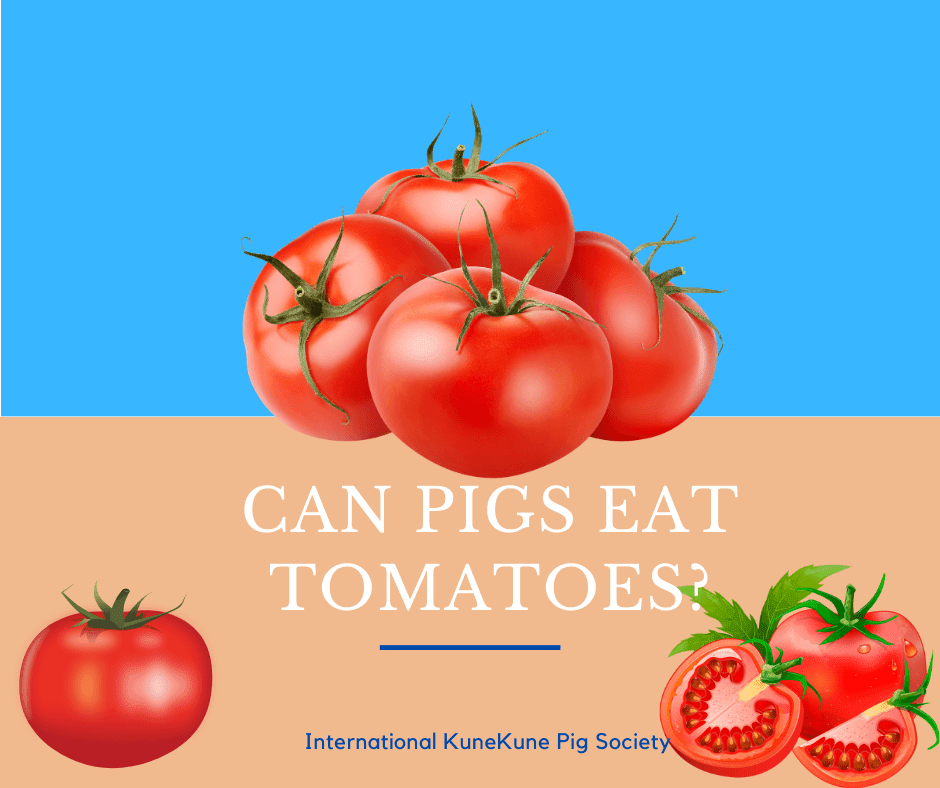
There is a common misconception that pigs cannot eat tomatoes. However, contrary to this notion, pigs can indeed eat tomatoes safely and without any negative health effects.
Tomatoes, being a fruit and a member of the nightshade family, have occasionally been associated with toxicity in certain animals. This has led to the assumption that pigs should avoid consuming tomatoes altogether. However, it is important to understand that the toxicity associated with tomatoes is primarily limited to specific parts of the fruit, such as the leaves and stems, rather than the actual tomato itself.
Nutrition
The part of the tomato that is considered safe for pigs to consume is the ripe fruit. Ripe tomatoes are not only safe for pigs but can also be a beneficial addition to their diet. Tomatoes are a reliable source of vitamins A, C, and K, as well as potassium and fiber. They can provide essential nutrients that contribute to the overall health and well-being of pigs.
In addition to being nutritious, tomatoes can also be a valuable dietary enrichment for pigs. Introducing a variety of fruits and vegetables into their diet can help prevent boredom and encourage natural foraging behavior. Pigs, being highly intelligent and curious animals, enjoy investigating different food items and engaging in the process of seeking out their meals. Therefore, offering tomatoes as part of their dietary variety can enhance the overall welfare and mental stimulation of pigs.
Moderation is Key
It is worth noting, however, that tomatoes should still be given to pigs in moderation. While they are safe, excessive consumption may lead to digestive problems such as diarrhea or an upset stomach. Like with any other food, a balanced and varied diet is key to ensuring the health and well-being of pigs. It is always important to consult a veterinarian or an animal nutritionist for specific dietary guidelines and recommendations.
Summary
In conclusion, pigs can eat tomatoes without any major risks or health concerns. As long as the ripe fruit is given in moderation and as part of a balanced diet, tomatoes can provide essential nutrients and enrichment to pigs' lives. So, let us break the myth that pigs cannot eat tomatoes and embrace the diverse diet of these intelligent and fascinating animals.
Can Pigs Eat Lettuce?
Lettuce, a leafy green vegetable that is commonly used in salads and sandwiches, is a staple in the diets of many humans. However, when it comes to feeding animals such as pigs, the question arises - can pigs eat lettuce? To answer this question, we must explore the dietary requirements of pigs and the nutritional value of lettuce.
Nutrition
In terms of nutritional value, lettuce is a low-calorie vegetable that contains various vitamins and minerals. It is rich in vitamins A, C, and K, as well as minerals like potassium and calcium. Lettuce also contains dietary fiber, which aids in digestion. These nutrients are undoubtedly beneficial for humans, but what about pigs?
Feeding pigs lettuce, just like any other vegetable, can be a healthy addition to their diet. However, it should not make up a sizable portion of their meals. Pigs require a well-balanced diet that includes a mixture of grains, vegetables, fruits, and protein sources. Lettuce alone cannot provide all the necessary nutrients that pigs need to thrive.
Digestion
Additionally, there are certain considerations when feeding pigs lettuce. It is important to wash the lettuce thoroughly to remove any pesticides or chemical residues that may be harmful to the pigs. The lettuce should also be fresh and not spoiled, as spoiled lettuce can cause digestive issues for pigs. Care should also be taken when introducing new foods into a pig's diet, including lettuce, to prevent any adverse reactions or digestive upset.
Moderation
Furthermore, the quantity of lettuce given to pigs should be moderate. Feeding them substantial amounts of lettuce can lead to an upset stomach or diarrhea. Lettuce should be seen as a treat or an occasional addition to their diet rather than a primary source of nutrition
Summary
In conclusion, pigs can eat lettuce, but it should not be their sole source of nutrition. Lettuce can be a healthy addition to a pig's diet, providing them with vitamins and minerals. However, a well-balanced diet that includes various other food sources is essential for the overall health and well-being of pigs. As with any new food, it is important to introduce lettuce gradually and in moderate quantities to avoid any negative effects on the pig's digestive system.
Can Pigs Eat Watermelon Seeds?
Watermelon seeds are small, hard-shelled seeds found in the fruit's interior. They are often discarded when eating watermelon, as they are seen as an inedible part of the fruit. However, many humans and animals consume watermelon seeds after removing the shell.
When it comes to pigs, their digestive systems are designed to handle a diverse range of foods, including fruits and vegetables. While they can consume watermelon flesh and may enjoy it, the same cannot be said for the seeds. The hard shell surrounding the seed can pose potential problems for pigs during digestion.
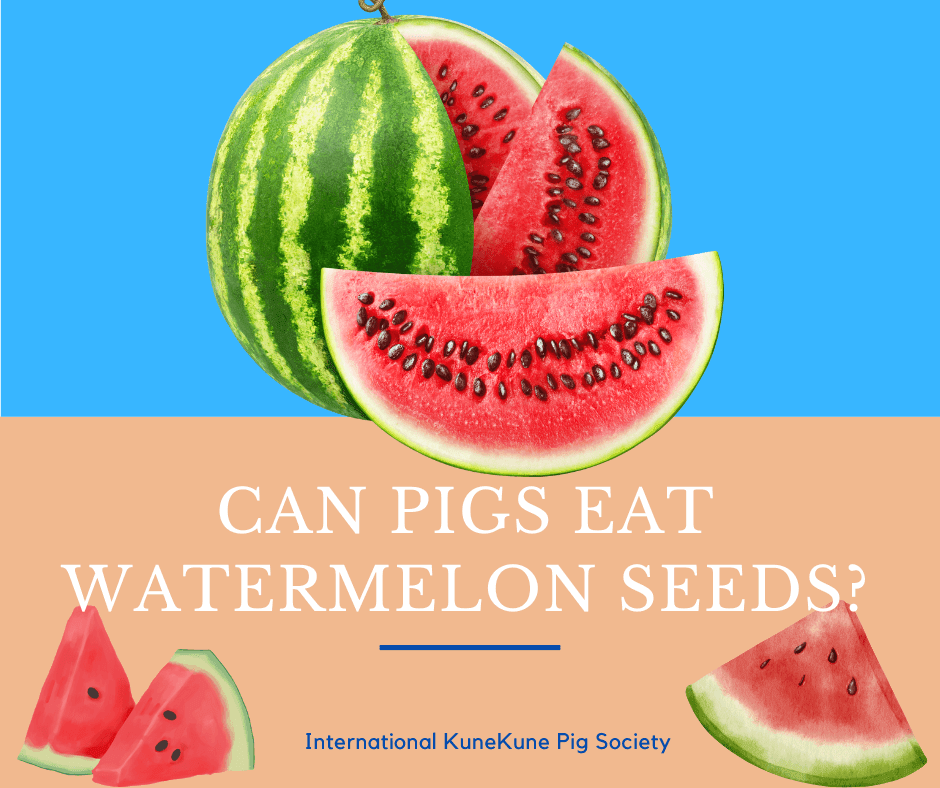
Due to their small size and hardness, pigs may not easily chew watermelon seeds. Swallowing whole seeds without proper chewing could lead to potential blockages or choking hazards, which can be dangerous and life-threatening for these animals.
Moreover, watermelon seeds contain a substance called cyanide. Although the seeds do not contain a significant amount that poses a risk to humans, they can be harmful to pigs if consumed in enormous quantities. Cyanide can interfere with an animal's ability to transport oxygen throughout its body, leading to severe health complications.
Another consideration is that watermelon seeds do not provide significant nutritional value for pigs. These animals require a balanced diet to meet their nutritional needs for growth, reproduction, and overall health. While watermelon flesh can be a refreshing and hydrating treat for pigs, it is more beneficial to feed them a proper pig diet that includes a combination of grains, vegetables, fruits, and protein sources.
Summary
In conclusion, although pigs have a versatile diet that allows them to consume a range of food items, watermelon seeds should not be included. The hard shell of the seeds, potential choking hazards, the presence of cyanide, and their limited nutritional value make watermelon seeds unsuitable for pig consumption. It is essential to provide pigs with a well-balanced diet that meets their specific nutritional requirements for optimal health and well-being.
Can pigs eat ginger?
Ginger is a flavorful and aromatic root that is often used to add zest to dishes, both in its raw and cooked forms. It contains a variety of compounds, including gingerols and shogaols, which are believed to possess anti-inflammatory and antioxidant properties. While humans can benefit from incorporating ginger into their diets, what about pigs?
Pigs, being opportunistic eaters, tend to explore and consume a wide range of food items. Therefore, they could potentially eat ginger if it is offered to them. However, it is important to consider a few factors before feeding ginger to pigs.
Firstly, pigs have sensitive digestive systems that can be easily upset by certain foods. Introducing added items into their diet should be done gradually and in moderation, as sudden changes can lead to gastrointestinal issues such as diarrhea or bloating. Therefore, if ginger is to be fed to pigs, it should be given in small quantities first to see how their bodies respond.
Secondly, while ginger is considered safe for human consumption, some animals may react differently to certain foods due to their unique biology. Therefore, it is always recommended to consult with a veterinarian or an animal nutrition expert before incorporating new foods into a pig's diet, including ginger. They can provide guidance and ensure that the pig's nutritional needs are met.
Another important consideration is the potential impact of ginger's strong flavor on a pig's appetite. Pigs have a highly developed sense of smell and taste, and they often rely on these senses to determine whether or not a certain food is palatable. While ginger has a distinct taste, it may not be appealing to all pigs, and they may reject it. Therefore, it is necessary to observe their reaction and adjust their diet accordingly.
Furthermore, it is crucial to consider the source and quality of the ginger before feeding it to pigs. Pigs should be given fresh ginger that is free from any pesticides or chemicals, as these can be harmful to their health. It is recommended to provide organic ginger, preferably sourced from reliable suppliers, to ensure the pig's safety.
Summary
In conclusion, pigs can eat ginger, but it should be done with caution and after considering several factors. The introduction of ginger into their diet should be done gradually, in small quantities, and under the guidance of a veterinary professional. Pigs may have different reactions to ginger, so it is important to monitor their response and adjust their diet accordingly. Additionally, the quality and source of the ginger should be carefully considered to avoid any potential harm to the pig's health.
Can Pigs Eat Citrus?
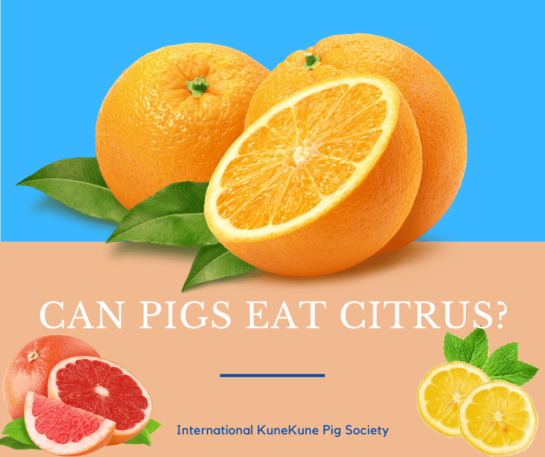
This is one particular food group that has sparked debate among pig owners and enthusiasts – citrus fruits. Citrus fruits, such as oranges, lemons, and grapefruits, are widely consumed by humans due to their high nutritional value and refreshing taste.
On one hand, citrus fruits are recognized for their numerous health benefits that can be transferred to animals, including pigs. These fruits are rich in vitamins C and E, dietary fiber, and natural antioxidants. These nutrients promote a strong immune system, aid in digestion, and prevent oxidative damage. By incorporating citrus fruits into a pig's diet, it is possible to enhance its overall health and well-being. Furthermore, some studies suggest that pigs fed a diet containing citrus fruits exhibit improved growth rates and enhanced reproductive capabilities.
On the other hand, there are risks involved in feeding pigs citrus fruits. One of the main concerns revolves around the acid content in such fruits. Citrus fruits, especially lemons and grapefruits, contain elevated levels of citric acid. Acidic foods can cause gastrointestinal issues, including upset stomachs, acid reflux, and diarrhea in pigs. Additionally, the acid content can cause discomfort and irritation in the pig's oral cavity and may potentially damage their teeth and gums. Another crucial point to consider is the sugar content present in citrus fruits.
Pigs are prone to obesity and related health issues, so a diet high in sugar can exacerbate these concerns. Thus, it is important to incorporate citrus fruits in moderation to avoid any adverse effects on the pig's health.
Furthermore, it is essential to note that not all citrus fruits are equally suitable for pigs. Oranges, for instance, are safe to feed pigs in moderation due to their lower acid content compared to lemons and grapefruits. However, it is crucial to remove any seeds from the fruit before offering it to a pig, as they can be a choking hazard. Lemons and grapefruits, with their higher acidity levels, should be introduced cautiously. Pigs with pre-existing gastrointestinal issues or sensitive stomachs should avoid consuming citrus fruits altogether, as the acid can worsen their condition.
Summary
In conclusion, the debate surrounding whether pigs can eat citrus fruits is a complex one. Citrus fruits possess various health benefits, providing essential nutrients to pigs and potentially enhancing their overall well-being. However, it is essential to proceed with caution due to the high acid content in these fruits. Acid can lead to gastrointestinal issues and discomfort, as well as potential dental problems. It is advisable to feed citrus fruits in moderation and choose the less acidic options, such as oranges when incorporating them into a pig's diet. It is essential to prioritize the pig's health and consider individual factors before introducing citrus fruits into
their regular feeding regimen.
Can Pigs Eat Apples?
When considering whether pigs can eat apples, it is essential to understand their dietary requirements. Pigs are classified as non-ruminant herbivores, meaning they have a simple digestive system. In order to maintain optimal health, pigs need a balanced diet that provides them with the necessary nutrients to support their growth and well-being.
Apples can be a valuable dietary component for pigs due to their rich nutritional content. These fruits are an excellent source of vitamins such as vitamin C and vitamin A, which are crucial for the pig's immune system and overall health. Additionally, apples contain dietary fiber, which aids in digestion and promotes healthy bowel movements in pigs.
Incorporating apples into a pig's diet can also contribute to dental health. Chewing on apples helps to strengthen the pig's teeth and gums, preventing dental problems that can arise from a lack of dental stimuli. Moreover, the natural sugars present in apples provide a tasty treat for pigs, promoting their overall enjoyment during feeding.
However, it is important to note that moderation is key when feeding pigs apples. While fruit is a healthy addition to their diet, it should not replace their staple foods of grains and vegetables. Overfeeding pigs with apples can result in digestive issues, such as diarrhea, due to their high sugar content. Therefore, it is recommended to offer apples as an occasional treat rather than a primary food source.
It is also crucial to be cautious about the way apples are fed to pigs. Whole apples should not be provided, as pigs can potentially choke on large pieces. Instead, apples should be cut into smaller, manageable pieces to ensure safe consumption.
Lastly, it is essential to consider the source and quality of the apples being fed to pigs. Organic or pesticide-free apples are preferred to avoid exposing the pigs to potentially harmful chemicals. Additionally, rotting or moldy apples should never be given to pigs, as these can cause health issues.
Summary
In conclusion, pigs can indeed eat apples and can benefit from their nutritional value. Apples provide vitamins, dietary fiber, and dental stimulation, making them a suitable addition to a pig's diet. However, moderation and caution should be exercised to avoid overfeeding and potential choking hazards. Feeding pigs healthy and properly cut apples can be a small yet significant contribution to their overall well-being.
Can Pigs Eat Pumpkins?
The short answer is yes, pigs can eat pumpkins. Pumpkins are considered a healthy and nutritious food for pigs. They are low in fat and calories, high in fiber, and contain essential vitamins and minerals that contribute to the overall well-being of these animals.
Pumpkins are an excellent source of vitamins such as A, C, and E, which are essential for a pig's immune system, skin health, and proper development. Additionally, they are rich in minerals like potassium and magnesium, which aid in maintaining the pig's bones, muscles, and nervous system functioning optimally.
Feeding pumpkins to pigs also has several benefits for their digestive system. The high fiber content in pumpkins aids in digestion and helps prevent issues like constipation. It can also contribute to a healthier gut by promoting the growth of beneficial bacteria, which aids in the overall digestive process.
Besides being nutritious, pumpkins can be a valuable food source for pigs for other reasons as well. When considering the overall cost of animal feed, pumpkins can be an affordable and sustainable option. These fruits often go to waste after the harvest season, making them easily accessible and inexpensive for pig farmers. Feeding pumpkins to pigs can help reduce food waste and promote a more sustainable farming practice.
It is worth noting that while pumpkins can be beneficial for pigs, they should not be the sole source of nutrition. Pigs require a balanced diet that includes a combination of different foods to meet their nutritional needs. Farmers should ensure that the pigs receive a well-rounded diet that includes grains, vegetables, and protein sources to maintain their optimal health and growth.
Summary
In conclusion, pigs can indeed eat pumpkins, and they can be a valuable addition to their diet. Pumpkins offer numerous health benefits, including being low in fat, high in fiber, and packed with essential vitamins and minerals. Furthermore, they can help promote a healthy digestive system and contribute to sustainable farming practices. However, it is crucial to remember that pumpkins should not be the sole source of nutrition for pigs, and a well-rounded diet should be provided to ensure their overall well-being.
Registry Office
17500 Hamilton Arms Court Dewitt, VA 23840